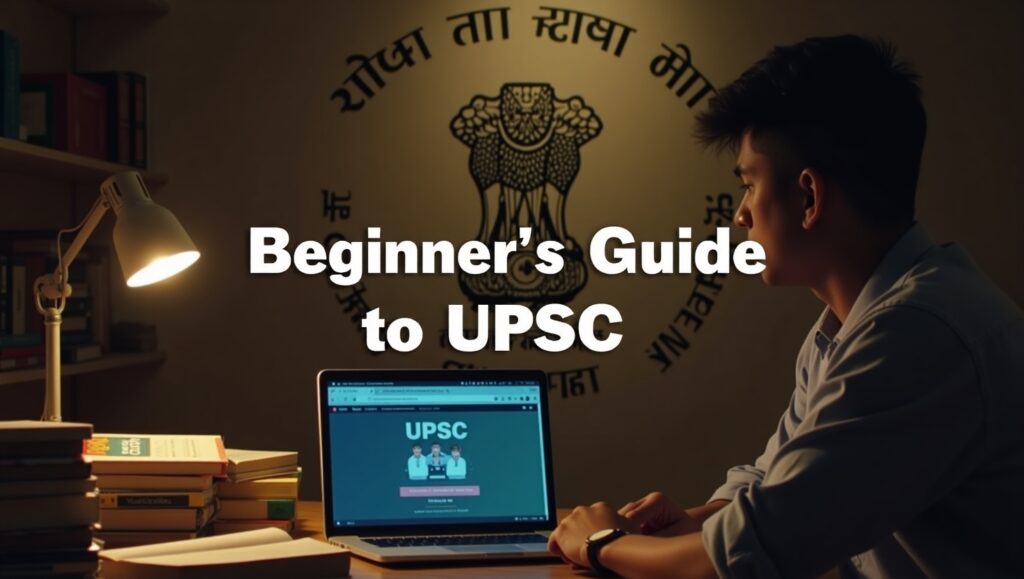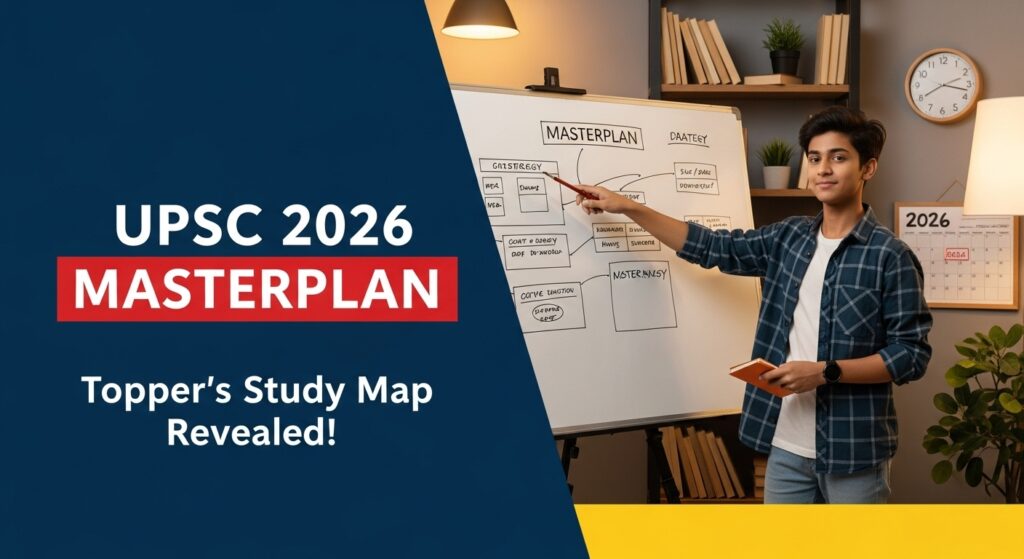Introduction

UPSC Preparation for Beginners : The Union Public Service Commission (UPSC) Civil Services Examination (CSE) is considered one of the toughest and most prestigious exams in India. Every year, lakhs of aspirants apply with the dream of becoming IAS, IPS, IFS, or other Group A and Group B officers. But if you’re a complete beginner and don’t know where to start, don’t worry. This guide is designed just for you!UPSC Preparation for Beginners
In this article, we’ll walk you through:
Exam structure and syllabus
Eligibility criteria
Study strategy for beginners
Subject-wise preparation
Resources, books, and tips
Let’s get started!
What is UPSC CSE?
The UPSC Civil Services Examination (CSE) is conducted every year to recruit candidates for various civil services of the Government of India. The top services include:
UPSC Preparation for Beginners
IAS (Indian Administrative Service)
IPS (Indian Police Service)
IFS (Indian Foreign Service)
IRS (Indian Revenue Service)
and more than 20 other services.
It is a nationwide competitive exam and is known for its depth, range, and unpredictability. But with smart preparation and dedication, cracking UPSC is absolutely possible.
Who Can Apply? (Eligibility Criteria)
Here are the basic eligibility criteria:
-
Nationality: Indian citizens for IAS, IPS; for other services, rules differ slightly.
-
Age Limit:
-
General: 21 to 32 years
-
OBC: up to 35 years
-
SC/ST: up to 37 years
-
-
Educational Qualification: Graduation in any stream from a recognized university.
-
Number of Attempts:
-
General: 6 attempts
-
OBC: 9 attempts
-
SC/ST: Unlimited till age limit
- A Complete Beginner’s Guide to UPSC Preparation 2026
-
✅ UPSC Exam Pattern (3 Stages)
1. Preliminary Examination (Prelims) – Objective Type
Paper I: General Studies (GS) – 200 marks
Paper II: CSAT (Qualifying – 33% needed) – 200 marks
2. Main Examination (Mains) – Written (Descriptive)
9 Papers in total (7 counted for merit, 2 qualifying):
Essay
GS I (History, Geography, Society)
GS II (Polity, Governance, IR)
GS III (Economy, Environment, Science)
GS IV (Ethics, Integrity, Aptitude)
Optional Subject Paper I & II
English (Qualifying)
Indian Language (Qualifying)
3. Personality Test (Interview)
275 Marks
Conducted at UPSC Bhawan, New Delhi
- A Complete Beginner’s Guide to UPSC Preparation 2026
✅ Beginner’s Strategy: How to Start UPSC Preparation from Zero
If you’re a beginner, follow this roadmap:
Step 1: Understand the Syllabus & Exam Pattern
Download and read the UPSC syllabus multiple times.
Understand what is asked in Prelims vs Mains.
Refer to previous years’ question papers (last 5–10 years).
Step 2: Make a 1-Year Preparation Plan
Usually, you need 12–15 months of serious study.
Break your preparation into:
Foundation Building (first 4–6 months)
Prelims Focus (next 3–4 months)
Mains Practice (last 4–5 months)
Revision + Test Series (last 2 months)
Step 3: Start with NCERTs
Begin with NCERT textbooks (Class 6 to 12) for History, Geography, Polity, Economics, and Science.
Recommended NCERTs:
History: 6 to 12 (Especially 9, 10, 11, 12)
Geography: 6 to 12
Polity: Class 9 to 12 + Lakshmikanth
Economics: Class 9 to 12 + Indian Economy by Sanjeev Verma or Ramesh Singh
Science: 6 to 10 (basic understanding is enough)
Step 4: Read a Daily Newspaper
Newspaper reading is non-negotiable.
Recommended: The Hindu or The Indian Express
Focus on:
National issues
Government schemes
Editorials
Supreme Court judgments
Environment, Science & Tech
Make daily notes or use a digital note-taking app.
Step 5: Choose Your Optional Subject
Choose optional wisely — based on your interest, background, and availability of materials.
Popular Optional Subjects:
PSIR (Political Science & International Relations)
Geography
History
Sociology
Anthropology
Philosophy
Public Administration
Spend 1–2 weeks sampling a few optionals before finalizing.
Step 6: Follow Standard Books
Some must-read standard books:
Polity – M. Laxmikanth
History – Spectrum Modern History, NCERTs
Geography – NCERT + GC Leong + Atlas
Economy – Nitin Singhania, Ramesh Singh
Environment – Shankar IAS
Science & Tech – Current Affairs + NCERTs
For ethics, you can refer to Lexicon or Subbarao.
UPSC Preparation for Beginners
✅ Prelims-Specific Tips
Focus on factual clarity.
Practice mock tests regularly.
Revise static + current affairs repeatedly.
CSAT is qualifying but don’t ignore it. Practice comprehension & maths basics.
✅ Mains-Specific Strategy
Focus on answer writing – develop a habit early.
Prepare short notes for revision.
Practice essay writing – 2 per month minimum.
Include data, diagrams, examples in your answers.

✅ Interview/Personality Test Preparation
Stay updated with current events.
Improve communication skills.
Know your DAF (Detailed Application Form) well.
Join mock interviews if possible
✅ Online vs Offline Coaching – Should You Join?
If you’re self-disciplined, self-study + test series + online resources is enough. But coaching can help in:
Structured study
Peer motivation
Doubt solving
Free online platforms like:
YouTube (Mrunal, Study IQ, Unacademy)
Websites like ClearIAS, InsightsIAS, ForumIAS
✅ Time Table for Beginners (Sample)
| Time Slot | Activity |
|---|---|
| 6:00 – 7:00 AM | Newspaper Reading |
| 7:00 – 9:00 AM | Static Subject (e.g., Polity) |
| 9:00 – 10:00 AM | Break/Breakfast |
| 10:00 – 12:00 PM | Optional Subject |
| 12:00 – 1:00 PM | Revision of notes |
| 2:00 – 4:00 PM | Practice MCQs/Test Series |
| 4:00 – 6:00 PM | Current Affairs/Editorials |
| 7:00 – 9:00 PM | Answer Writing + Review |
You can customize this as per your schedule.
✅ Useful Online Resources
Previous Year Papers – upsc.gov.in
Daily Current Affairs – InsightsIAS, Vision IAS
Mock Tests – ForumIAS, IAS Baba
PDF Notes – Mrunal, CivilsDaily
✅ Top Mistakes to Avoid
Ignoring the syllabus
Blindly following toppers without context
Not revising
Delaying answer writing practice
Over-dependence on coaching
Not managing time well
✅ Motivational Note
Cracking UPSC is not about being a genius — it’s about being consistent, smart, and patient. You don’t need to study 15 hours a day — even 6–8 focused hours daily for 1 year is enough if done right.
Remember: “Discipline beats motivation
🏁 Conclusion
UPSC is a long journey, but also a transformative one. It not only helps you become an officer but also a better-informed citizen. If you’re a beginner, start with small, consistent steps — build your basics, stay updated, practice regularly, and believe in yourself.
Your UPSC journey starts today — one step at a time



![UPSC 2025 Syllabus Change – What’s New? [Complete Update] UPSC 2025 Syllabus Change](https://iasprep.online/wp-content/uploads/2025/07/Whisk_6b024d21f0-1024x559.jpg)
Ase beginner plan 2028 ke aspirants ke bhi ready jisme 1 August 2025 se start kreke strategy ho
Mane 2026 ka plan banaya hai abhi 2027 and 2028 ka bhi master plan bana raha hu wait karo 1 ya 2 din me ready ho jayega
Pingback: Udaipur Files Real Story: उदयपुर कन्हैयालाल हत्या कांड
Very helpful, thank you..
Pingback: Best Books for UPSC Prelims 2025 – Subject Wise List